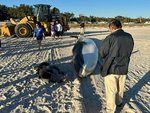



On January 7, the Institute for Marine Mammal Studies (IMMS) responded to a report of a lone, dead whale washed up in the waters of the Mississippi Sound along the shoreline of the Pass Christian beach, and it took a team effort and multiple agencies to properly handle the situation.
"It was a tremendous effort to retrieve this animal from the water,” says IMMS Stranding Coordinator Theresa Madrigal. “We would like to thank Mayor Rafferty, the Pass Christian Police Department, the Pass Christian Fire Department, and the Harrison County Sand Beach Authority for their incredible help. We could not have done this without them."
Partners in the Stranding Network, including the IMMS, MSU DISL, Gulf World and FWC, teamed up to secure the carcass of the fin whale, collect measurements and some samples and to conduct a full necropsy (animal autopsy) on January 8.
The fin whale measured about 30 feet in length and weighed somewhere between 12,000 and 15,000 pounds. Madrigal says since 2002, there have only been three fin whale strandings in the Gulf of Mexico, dating back to January 2003 in Gulf County, Florida, and in February 2010 and December 2012 in Texas. This is the first fin whale stranding reported in Mississippi.
"We hope to learn as much as possible from this animal. This was a young male fin whale, a species that is endangered and protected, so it was critical for us to document this case thoroughly,” Madrigal says. “All data and samples collected are being extensively analyzed, so that we can hopefully determine what caused this animal to strand and gain a better understanding of fin whales."
The fin whale is the second largest whale species on earth, second only to the blue whale. It is found throughout the world’s oceans and gets its name from an easy-to-spot fin on its back, near its tail. Fin whales are protected under the Marine Mammal Protection Act.
"It is very rare for whales to strand on the Mississippi Coast,” Madrigal says. “These animals will stay miles offshore. When we start to see large whales like this coming inshore, it is generally an indicator that they are sick and will likely strand.”
While study, research and analysis of data collected from the washed up fin whale is still underway and being processed, IMMS leaders urge the public to report any and all strandings and sightings of injured or beached marine life.
“We want to remind the public to call our 24-hour hotline (888-767-3657) if they see any dead, sick or injured marine mammals and sea turtles,” Madrigal says. “Their reports are critical for us to successfully do our work here in Mississippi to conserve these species."